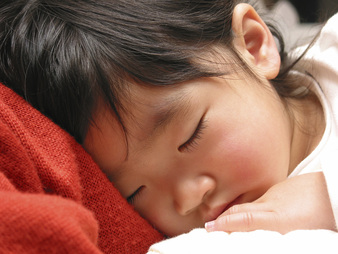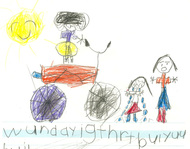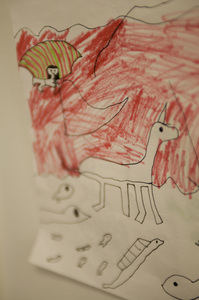Understanding Your Child’s Sleep
Sunny Im-Wang, Psy.D., SSP
Getting restful, adequate sleep is crucial to good health—both physical and mental. We spend approximately one-third of our life sleeping, yet experts still don’t know exactly what happens when we sleep. But we do know that we can’t function well without it. If you have children, you know that they need much more sleep than adults do. In fact, on average, a newborn baby needs between 12 to 18 hours of sleep per day. Toddlers require between 12 and 14 hours of sleep, and older children require an average of 10 to 11 hours per night.1 Most adults need only 7.5 to 9 hours of sleep for optimal health and functioning. Sleep Stages As you sleep, you go through five different stages. These stages are dictated by your brain. Understanding the stages of sleep will help you better understand the effects on your child if he or she is awakened during a particular stage.
The Sleep Cycle Everyone repeats stages 2 through 5 several times throughout the night. Each cycle lasts about 90 minutes, so on any given night, your child will repeat this cycle several times until he wakes up.2 Although the length of the cycles is the same, the majority of deep sleep takes place during the first part of the night, whereas the REM stages are longer during the latter part of the night. Nightmares and Night Terrors It is important to know the difference between night terrors and nightmares. Since their origins are different, the ways in which you approach them will be very different. Night terrors in children usually occur during the early part of the night, as they transition from stage 3 to stage 4. Night terrors are not dreams; rather, they are a highly aroused state in which the child is very frightened.2 It is almost as if the child’s body is awake, but his mind is not. Nightmares, on the other hand, are bad dreams that may be quite vivid. They are more likely to occur in the wee hours of the morning, during REM sleep. A child usually won’t remember having a night terror, whereas he may remember a nightmare. With nightmares, you can gently awaken your child to comfort and reassure him. But with night terrors, it’s best not to try to awaken your child. If you do, not only will he be very confused and disoriented, but he may also have a harder time getting back to sleep. He will not be responsive to reasoning or consoling. Typically, even your presence might frighten him, as he may mistake you for a figure who is trying to harm him. Remember, your child may look awake, but he is not. If you are concerned that he might hurt himself while crying and moving too harshly, stay with him until the night terror passes. Since your child may thrash or try to get out of bed during a night terror, you may need to use gentle restraint to prevent him from injury. Bedtime Tips for Parents Following are tips to help ensure that your child gets a good night’s sleep:
For permission to reprint an article, click here. © 2011 Sunny Im-Wang, Psy.D. All rights reserved. Reference:
|
Here are more articles you might want to readThe Importance of Self Care for Parents

Tips for Managing Parenting Anxiety
Executive Function: Problem Solving Skills and Other Complex Thinking Skills in Children

Picture Journaling for Young Children

Storytelling and Bookmaking Activities

Air Travel with Young Children: Airport, Airplane, and the Air Pressure?

|
Copyright © 2011-2024: Sunny Im-Wang, Psy.D., S.S.P. All Rights Reserved.
DISCLAIMER: The information on this site is for general information only. This information should not be construed to be either formal psychological or medical advice or the formation of a professional relationship with the authors of any of this information.
Persons accessing this site are encouraged to seek independent professional advice regarding their individual issues.
DISCLAIMER: The information on this site is for general information only. This information should not be construed to be either formal psychological or medical advice or the formation of a professional relationship with the authors of any of this information.
Persons accessing this site are encouraged to seek independent professional advice regarding their individual issues.